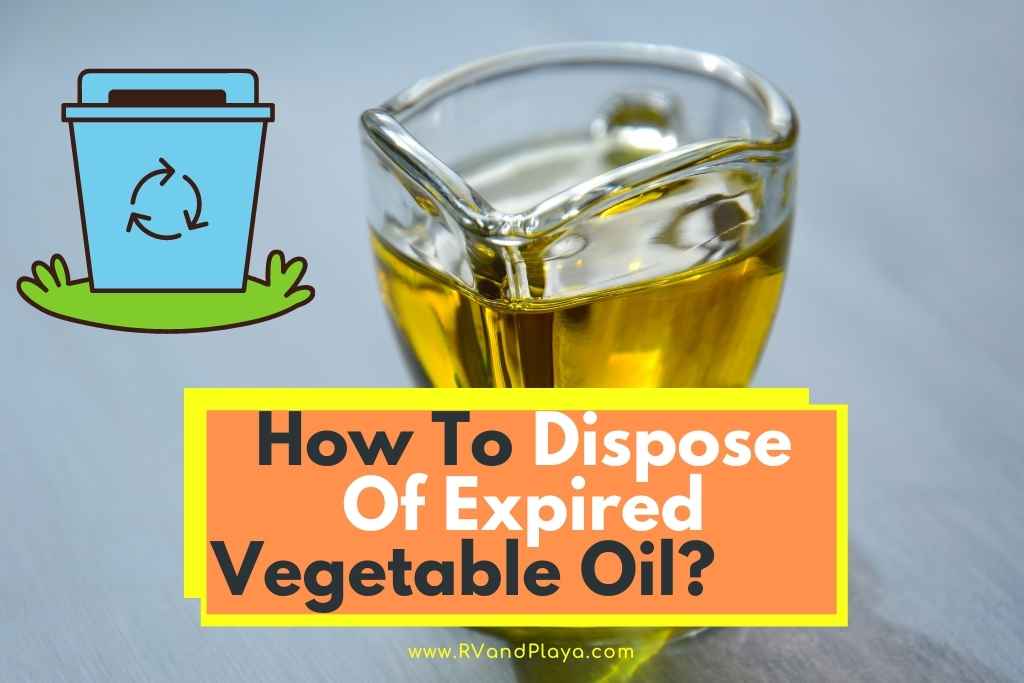Have you ever asked yourself or your friend how to dispose of expired vegetable oil or how to recycle cooking oil, canola oil, and peanut oil? Well, you are at the perfect place to find the answer to such a question.
For many, expired vegetable oil is an afterthought and is most often incorrectly disposed of by flushing down the drain.
This is a huge problem, especially in colder regions, as all oils solidify at colder temperatures and wreak havoc for local communities by clogging pipes in local sewer systems (and your home).
There is an effective solution.
So, how to dispose of expired vegetable oil? The safest and most effective way to dispose of expired vegetable oil is by pouring it into a non-breakable container with a sealable lid. Vegetable oil, unused vegetable oil, cooking oil, peanut oil, Canola oil, and grease can all be properly disposed of at specialized sites, such as drop-off recycling centers or waste depots. These locations can be easily found locally throughout the US in the Green Directory.
Whatever you do, do not dump your expired vegetable oil (or any oil or grease) down the drain, as it’s illegal, not to mention how bad it is for the environment.
Let’s look at some super easy tips on how to dispose of expired vegetable oil, including a few tips that will save you money too!
Table of Contents
What is vegetable oil made of?
Vegetable oils are oils extracted from seeds or fruits and these oils are often termed vegetable fats.
Vegetable fats are a mixture of triglycerides, similar to animal fats, and these fats are extracted from a range of plant-based sources.
While vegetable oil sold in the US is often made using soybean oil, other sources of fats extracted from seeds include grape seed oil and cocoa butter.
Olive oil and palm oil are examples of fats extracted from fruits, and all are considered edible and suitable for use in cooking or food preparation.
Read also: How to Dispose of Extra Virgin Olive Oil (Explained!)
What happens to oil that goes down the drain?
The problem with many vegetable oils (fats) is that they eventually become solid and will clog drains and pipes when not disposed of correctly.
Many local councils struggle with this issue, especially in places that experience freezing temperatures during the winter.
In fact, in most regions of the US, it is illegal to pour any type of oil down the drain, with some councils slapping oil dumpers with hefty fines.
The expensive risk of fatbergs
When oil reaches the sewer system, it interacts with all of the other waste, chemicals, and cleaning supplies and causes fatbergs, a rock-like substance that accumulates and clogs pipes, causing serious problems down the line.
Fatbergs form when mixed with flushed non-biodegradable solids (wet wipes, sanitary products, and nappies) and cooking oils and grease.
Vegetable oil also wreaks havoc on the pipes and drains of your home too.
Ask any homeowner who has had to fork out for repairs to unclog pipes and they’ll admit it is an expensive exercise and best avoided.
Without a doubt, it’s best to avoid unnecessary maintenance expenses just for a bit of fried food, so never (ever) flush or dump vegetable oil down the drain!
When will vegetable oil solidify?
All oils will solidify at a certain temperature that approaches freezing, with most vegetable oils becoming solid below 14°F (-10°C).
Vegetable oil is usually made with a few chemical blends of oil which vary from one manufacturer to another.
This in turn affects the exact ‘freezing’ temperature of vegetable oil.
Best tips to dispose of expired vegetable oil
Fortunately, there are some easy ways to properly dispose of expired vegetable oil or cooking oil.
First, consult the green directory for your nearest local recycling center.
Alternatively, speak to any restaurant owner, as they’ll likely dispose of their expired oils where you should.
Many communities also offer kerbside collections of spent oil as long as it is correctly contained.
Use a designated recycling point
It’s always best for the environment (and your local communities sewer system) if you dispose of expired vegetable oil responsibly at a designated recycling site.
There is one in almost every town in the US.
If you’re not sure where your nearest recycling depot is, check with your local community or council, or ask at town hall.
Use a non-breakable container with a sealable lid
It’s important to transfer your expired vegetable oil into a non-breakable container that is suitable for disposal.
Do not use glass jars as they easily break.
A large jar made with hard plastic (peanut butter jars) is ideal and comes with a screw-top lid that will seal the oil and prevent any spillage.
If you’re planning to use a kerbside oil collection service, consult your community guidelines for what containers are deemed acceptable for the collection of used cooking oils.
Reuse it
If you’re using vegetable oil for cooking or frying then it can be used at least 2-3 times before needing to be disposed of.
It’s important when reusing vegetable oil again to check it first smells OK and there’s no residual food left in the cooking container from the previous use.
Contaminated oil cannot be reused and should be disposed of responsibly.
Note, that each time you use vegetable oil, the smoking point will reduce so be careful not to burn it when cooking.
To reuse vegetable oil, allow it to cool sufficiently before decanting. Use a sieve or fabric filter (coffee filters work great) to pour the oil from the cooking vessel into the storage vessel.
A funnel works best and avoids turning your kitchen into an oil slick.
Store the oil in a glass jar (with a sealable lid) at room temperature and out of any direct sunlight. Always make a note of the time the oil was decanted too, as reusing oil has a limited lifespan of around 1-2 months maximum if stored properly.
Compost expired vegetable oil,
A little known fact is expired vegetable oil, cooking oil, Canola oil or peanut oil is great for the compost heap.
Critters that frequent your compost pile (earthworms, bugs, etc.) will thrive on the used oil and it saves you a trip to the recycling depot!
One word of caution, any cooking oil used to fry or prepare meat will have a strong odor and will likely attract wild animals (foxes, racoons, rodents).
It’s best to dispose of any cooking oil used for meat at a designated recycling depot as mentioned above.
Summary
Everyone loves a bit of fried food now and then, and now we’ve provided you with the best tips to properly dispose of your expired vegetable oil.
The easiest way is to use a designated recycling depot, or check whether your local community offers kerbside collection of spent cooking oils.
Don’t forget, you can also reuse vegetable oil a few times, and your compost heap loves vegetable oil too!
Whatever you do, don’t flush vegetable oil or dump it down the drain, not only is it illegal in most states of the US, it’s also bad for the environment and can clog pipes and drains that are expensive to repair.
Here are some of my favorite services, products, and Stores
There are affiliate links, so if you do decide to use any of them, I´ll earn a small commission. But in all honesty, these are the exact what I use and recommend to everyone, even my own family.
To see all my of most up-to-date recommendations, check out this resource that I made for you!
+ Products & Services
+ Convenience Stores
+ Save Thousands of Dollars
References
https://www.epa.gov/hwpermitting/how-do-i-find-hazardous-waste-management-facilities-my-area
https://greencitizen.com/how-to-dispose-of-cooking-oil
Recent Posts
Have you ever asked yourself or your friend how to dispose of Extra virgin olive oil? Well, you are at the perfect place to find the answer to such a question. Extra virgin olive oil is one of the...
Is Extra Virgin Olive Oil Refined (Or Unrefined - Best Tips!)
When shopping for olive oils, you may find that there are a plethora of types to choose from. However, it’s important to note that not all olive oils are best for cooking with, and not all are of...


